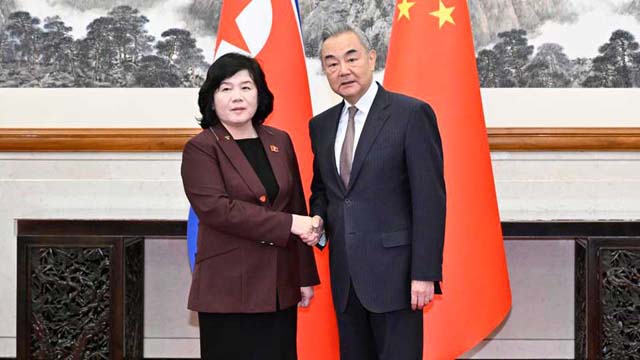News Flash

BEIJING, Sept 29, 2025 (BSS/AFP) - Beijing wants to strengthen cooperation with Pyongyang and work together to oppose hegemony, China's Foreign Minister Wang Yi told his North Korean counterpart, in a thinly veiled reference to the United States.
North Korea's Foreign Minister Choe Son-hui met Wang Sunday in the Chinese capital, weeks after a rare visit by North Korean leader Kim Jong Un, who sought to develop the countries' bilateral relations.
"Maintaining, consolidating, and developing China-DPRK relations has always been the unswerving strategic policy of" the Chinese government, Wang told Choe, using the acronym for North Korea.
"China is willing to strengthen coordination and cooperation with the DPRK in international and regional affairs, oppose all forms of hegemonism, and safeguard the common interests of both sides and international fairness and justice," he said, according to a Chinese foreign ministry readout.
The comments were a reference to the United States, China's primary competitor in recent years across a wide range of economic and geopolitical arenas.
North Korea's state news agency KCNA said Monday the ministers had agreed fully on a variety of issues in their discussions, according to the Yonhap news agency in South Korea.
The ministers "exchanged views on international and regional issues in depth and reached complete consensus," KCNA said, according to Yonhap.
Despite periods of strained relations between China and North Korea over Pyongyang's nuclear programme, the two neighbours have maintained close ties.
Kim stood alongside Chinese leader Xi Jinping in Beijiing this month at a huge military parade commemorating the 80th anniversary of the end of World War II.
Beijing is a vital source of diplomatic, economic and political support for the isolated nuclear state, and the two countries share common opposition to the United States.
Kim has said he is ready to resume contact with Washington if it stops demanding that Pyongyang abandon its nuclear weapons programme.
Pyongyang justifies its nuclear programme by citing threats it claims to face from the United States and its allies, including South Korea.